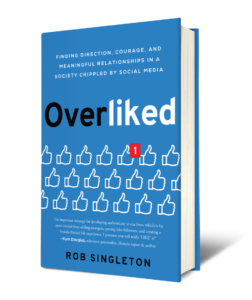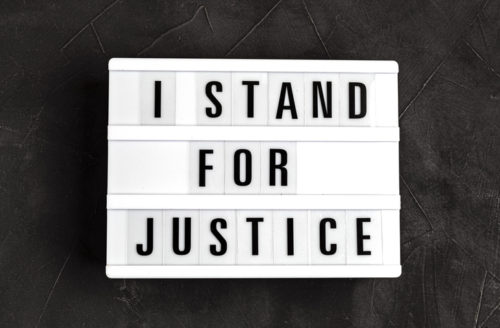Social justice…it’s a huge subject these days. But are we talking about the same thing when we talk about biblical justice and social justice? People today don’t cry out for justice so much as they appeal to social justice. “Is there a difference between the two, Pastor Rob?” (I’m glad you asked.) The differences, actually, are huge. In fact, social justice is not biblical justice at all.
With all themes in God’s word, there is a counterfeit that Satan will always present to keep people away from the truth. In short, God creates; Satan counterfeits. For example, the Bible is God’s truth. Well, Satan’s lies sometimes get close, but they’re still lies. There’s the kingdom of God and the kingdom of the world. There’s demon possession and being filled with the Holy Spirit. Completely different.
The power to counterfeit, though, is that it deceives someone into wrongly believing that what they have is real and true and valuable when, in fact, it’s fake and false…worthless. 1 John 4:1 says this to believers, “My dear friends, many false prophets have gone out into the world. So do not believe every spirit, but test the spirits to see if they are from God.” So that’s what we’re going to do. We’re going to dive into this weighty and somewhat divisive issue of today. I can’t cover all that God’s placed on my heart in one blog, though, so be sure to stick around.
Point of View Is Important
Now, according to the biblical worldview, people are children of God, fashioned in His divine image. According to social justice, though, we’re children of society, fashioned by its social constructions and the power dynamics that they may tame. So it seems there’s a biblical point of view and a worldly point of view.
Why does this matter? The apostle Paul addressed this very issue to the most worldly and secularized, dysfunctional church in all of Scripture, the churches in the city of Corinth.
In 2 Corinthians 5:16-19, Paul writes, “From now on we regard no one with a worldly point of view. Though we regarded Christ this way, so we do no longer. Therefore, if anyone is in Christ, the new creation has come: the old has gone, the new is here! All this is of God, who reconciled us to himself through Christ and gave us the ministry of reconciliation: that God was reconciling the world to himself in Christ, not counting people’s sins against them. And he has committed to us the message of reconciliation.”

If we as Christians have the just ministry of reconciliation, and this reconciliation is the goal, then we better understand if both roads—biblical justice and social justice—lead to the same place or if they don’t.
Do Our Words Really Matter?
Now, you might be thinking, “I don’t really see the difference,” or, “I don’t see why it matters. They’re both using the same words. Aren’t they both justice?” Well, it matters because it does no good to have the same vocabulary if we’re using different dictionaries. The Bible makes it very clear that the social justice of today is a strange justice. Words matter. They shape our ideas and form our belief systems. And these belief systems, in turn, drive our culture, which shapes how we think and how we behave.
Most people take words for granted. We just kind of use them and don’t think much about them. We rarely take the time to think through whether they hurt or help, and we’re unaware of their incredible power. Solomon said this about our words:
• Proverbs 11:9, “Evil words destroy one’s friends; wise discernment rescues the godly.”
• Proverbs 15:1a, “A gentle answer turns away wrath…”
That’s power.
But hard words stir up anger. That’s power too. Though there are many scriptures on this, here’s one more from Proverbs 15: “For gentle words bring life and health; a deceitful tongue crushes the Spirit.”
The power of our words is an even bigger theme in Proverbs than justice. So when the Evangelical Church of today (intentionally or unintentionally) exchanges the biblical definition of a word as important as justice with a counterfeit, it’s really not a small thing.
So, yes, our words really do matter.
A New Ideology – Social Justice
Like it or not, words associated with justice have changed—morphed. A new ideology has emerged, and it’s called social justice. And for a lot of people, it now replaces biblical justice.
So, how can you tell the difference? Let’s start first in social justice and with the thing they call identity politics. It’s a new term, but it traces its lineage back to famous philosophers and activists, such as Emmanuel Kant, Frederick Nietzsche, and Karl Marx, among others, and their ideas have taken deep root in Western culture. In fact, over time, they’ve morphed and mutated and even merged with other things in the school of thought that contemporary academics call critical theory. It has several other names, but for our purposes today, I’m going to refer to it as ideological social justice.

I say ideological for a reason. It’s to indicate that we are discussing something much bigger than just justice. Rather, it’s a comprehensive ideology or a worldview that helps to explain why it’s attracting so many adherents, especially millennials. Now, we need worldviews that make sense of our lives. They help us understand our identity and our purpose, and in our increasingly post-Christian (or I’d even say anti-Christian) culture, a growing number of people have no knowledge of the Bible. Yet, it was the biblical worldview that shaped the West for centuries. It provided the fundamental assumptions that supplied many generations with their identity of purpose, whether they were Christians or unbelievers. But today, with the Bible and the biblical worldview in rapid decline, ideological social justice is stepping up and filling the vacuum.
So here’s justice redefined: It’s the tearing down of traditional structures and systems, ones that are deemed oppressive, and it’s the redistribution of power and resources from the oppressors to the victims in the pursuit of equality of outcome.
This is a dangerous moment. If current trends continue, the Evangelical Church will be rapidly syncretized into a profoundly destructive and unbiblical ideology—the one we’ve been talking about–and it will do incalculable harm to its mission and the Church’s witness to the world.
Justice is one of the most important words in the Bible. It’s one of the most important concepts in any culture. That’s why we’re going to take our time with this one. Join me next Thursday for more on this critical topic. Until then, I invite you to check out my video series, Ask P-Ro, on my YouTube channel. I address many questions—some timely and others timeless—using the Bible as the ultimate source for guidance.
~Pastor Rob
Aka Ask P-Ro
(In addition to the Bible, I obtained some of the information for this blog on gotquestions.com and Scott Allen’s book, Why Social Justice Is Not Biblical Justice.)
